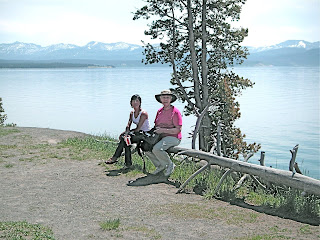Winter evenings are an extra pleasure because the early darkness seems to be permission -- someone with a serious work ethic sometimes needs permission to do something relaxed and entirely personal -- to settle down not long after dinner and read for several hours. I loved to draw the curtains, settle on the sofa with a cozy throw over my legs and work my way into and through a good book.
GOOD is the important word here. I decided within weeks of finishing college to continue my education with reading -- all kinds of reading -- books, magazines -- novels, nonfiction, poetry ... but GOOD ones. I have avoided a certain kind of "good" that many people enjoy very much: mysteries and adventure (TRUE adventure is excluded). Long ago I came to know myself well, at least in the area of needing to parcel my time. I'm sure I would enjoy good mysteries and there are quite a few good mystery writers. But those books are a kind of time-filler that gives very little back. I studiously avoid the so called "women's literature" and even more so the suddenly very popular "YA" (young adult) books. They also give almost nothing back.
I am hungry as I've always been for insight, depth, for new discoveries, for worlds I do not live in (and I don't mean fantasy worlds, although I've made exceptions, especially for Tolkien). I'm interested in how other people live and what their part of the world is like and what social mores they live within. And I'm interested in just about all science (that's not so deep I'd need more education than I have to even know the vocubulary). The world is full of GOOD book, the kind I want to read. And there are novelists whose work always interest me. I am a slow reader but I rarely forget a book I've read. I read "to kill time" only when I'm stuck in a waiting room without a book of my own. Why should I "kill time" when I have only so much time in my life?
I have read three excellent novels in the last couple of weeks, Peter Matthiessen's "In Paradise", Roberto Bolano's "The Skating Rink" and Sherman Alexie's "Reservation Blues." They have takenme places I could not go otherwise. Matthiessen's is set in Auschwitz (which, in fact, I could have gone to when in Poland but chose not to), Bolano took me to a small town near Barcelona and a group of people I would not meet if I visited there, and Alexie took me again (as in earlier books of his) to the Spokane Reservation in Washington among Native people I cannot get to know otherwise. Then I made a mistake: I picked up Elizabeth Berg's "The Art of Mending" at a thrift store because I have heard other women speaking of discussing her books at their book clubs. Maybe I'm missing something, I thought, so I read the book. It was like following a delicious three course dinner with a dessert of underbaked formerly frozen apple pie. I won't say more except that once again I knew why I don't belong to book clubs and don't read "women's lit."
Now and then someone tells me (or hints, sometimes politely) that I'm a book snob. I know how they feel, it's the way I feel when listening to a gourmand describing a wonderful new restaurant. I'm just not that interested in fancy food. So I shrug -- I enjoy what feels like brain food to me. Others enjoy light reading, maybe need, or maybe simply haven't discovered that books can show you worlds even more exciting and deep than the best TV or movies. Or so I think.
This feed has moved and will be deleted soon. Please update your
subscription now.
-
The publisher is using a new address for their RSS feed. Please update your
feed reader to use this new URL:
*http://www.timegoesby.net/weblog/atom.xml*
4 years ago
















































